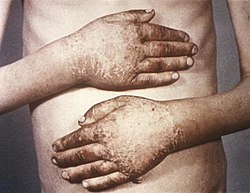Micronutrient deficiency
Editor-In-Chief: Prab R Tumpati, MD
Obesity, Sleep & Internal medicine
Founder, WikiMD Wellnesspedia &
W8MD medical weight loss NYC and sleep center NYC
| Micronutrient deficiency | |
|---|---|

| |
| Synonyms | N/A |
| Pronounce | N/A |
| Specialty | N/A |
| Symptoms | Fatigue, dizziness, pallor, hair loss, skin disorders, impaired immune function |
| Complications | Anemia, scurvy, rickets, pellagra, beriberi, goiter |
| Onset | Varies depending on the specific micronutrient |
| Duration | Chronic if untreated |
| Types | N/A |
| Causes | Poor diet, malabsorption, increased physiological needs |
| Risks | Malnutrition, poverty, alcoholism, gastrointestinal disorders |
| Diagnosis | Blood test, urine test, clinical evaluation |
| Differential diagnosis | Macronutrient deficiency, chronic disease, infections |
| Prevention | Balanced diet, fortification, supplementation |
| Treatment | Dietary changes, vitamin and mineral supplements |
| Medication | N/A |
| Prognosis | Good with treatment, potentially severe if untreated |
| Frequency | Common in developing countries, varies globally |
| Deaths | N/A |
Deficiency of essential vitamins and minerals
Micronutrient deficiency refers to the lack of essential vitamins and minerals required in small quantities for proper health and development. These nutrients are vital for the production of enzymes, hormones, and other substances necessary for growth and development. Micronutrient deficiencies can lead to a variety of health problems, including impaired physical and cognitive development, increased susceptibility to disease, and even death.
Common Micronutrient Deficiencies
Vitamin A Deficiency
Vitamin A is crucial for maintaining healthy vision, immune function, and skin health. Deficiency in vitamin A can lead to night blindness and increase the risk of infectious diseases such as measles and diarrhea. It is a significant public health issue in many developing countries.
Iron Deficiency
Iron is a key component of hemoglobin, the molecule in red blood cells that carries oxygen. Iron deficiency is the most common nutritional deficiency worldwide and is a leading cause of anemia. Symptoms include fatigue, weakness, and impaired cognitive function.
Iodine Deficiency
Iodine is essential for the production of thyroid hormones, which regulate metabolism. Iodine deficiency can lead to goiter and developmental delays in children. It is a major preventable cause of intellectual disability.
Zinc Deficiency
Zinc is important for immune function, wound healing, and DNA synthesis. Zinc deficiency can result in growth retardation, loss of appetite, and impaired immune function. It is particularly prevalent in regions with diets low in animal products.
Niacin Deficiency
Niacin, or vitamin B3, is important for energy metabolism. Deficiency can lead to pellagra, characterized by dermatitis, diarrhea, and dementia. Pellagra is often associated with diets high in corn and low in niacin or tryptophan.
Causes of Micronutrient Deficiencies
Micronutrient deficiencies can result from inadequate dietary intake, poor absorption, increased requirements, or increased losses. Factors contributing to these deficiencies include poverty, lack of access to diverse foods, and certain health conditions that affect nutrient absorption.
Prevention and Treatment
Preventing micronutrient deficiencies involves ensuring a balanced diet rich in fruits, vegetables, whole grains, and animal products. Fortification of foods, supplementation, and public health interventions are strategies used to address deficiencies. For example, iodized salt is used to prevent iodine deficiency, and vitamin A supplements are distributed in areas with high deficiency rates.
Global Impact
Micronutrient deficiencies affect billions of people worldwide, particularly in low- and middle-income countries. They contribute to the global burden of disease and have significant economic impacts due to reduced productivity and increased healthcare costs.
See also
Transform your life with W8MD's budget GLP-1 injections from $125.
W8MD offers a medical weight loss program to lose weight in Philadelphia. Our physician-supervised medical weight loss provides:
- Most insurances accepted or discounted self-pay rates. We will obtain insurance prior authorizations if needed.
- Generic GLP1 weight loss injections from $125 for the starting dose.
- Also offer prescription weight loss medications including Phentermine, Qsymia, Diethylpropion, Contrave etc.
NYC weight loss doctor appointments
Start your NYC weight loss journey today at our NYC medical weight loss and Philadelphia medical weight loss clinics.
- Call 718-946-5500 to lose weight in NYC or for medical weight loss in Philadelphia 215-676-2334.
- Tags:NYC medical weight loss, Philadelphia lose weight Zepbound NYC, Budget GLP1 weight loss injections, Wegovy Philadelphia, Wegovy NYC, Philadelphia medical weight loss, Brookly weight loss and Wegovy NYC
|
WikiMD's Wellness Encyclopedia |
| Let Food Be Thy Medicine Medicine Thy Food - Hippocrates |
Medical Disclaimer: WikiMD is not a substitute for professional medical advice. The information on WikiMD is provided as an information resource only, may be incorrect, outdated or misleading, and is not to be used or relied on for any diagnostic or treatment purposes. Please consult your health care provider before making any healthcare decisions or for guidance about a specific medical condition. WikiMD expressly disclaims responsibility, and shall have no liability, for any damages, loss, injury, or liability whatsoever suffered as a result of your reliance on the information contained in this site. By visiting this site you agree to the foregoing terms and conditions, which may from time to time be changed or supplemented by WikiMD. If you do not agree to the foregoing terms and conditions, you should not enter or use this site. See full disclaimer.
Credits:Most images are courtesy of Wikimedia commons, and templates, categories Wikipedia, licensed under CC BY SA or similar.
Contributors: Prab R. Tumpati, MD

